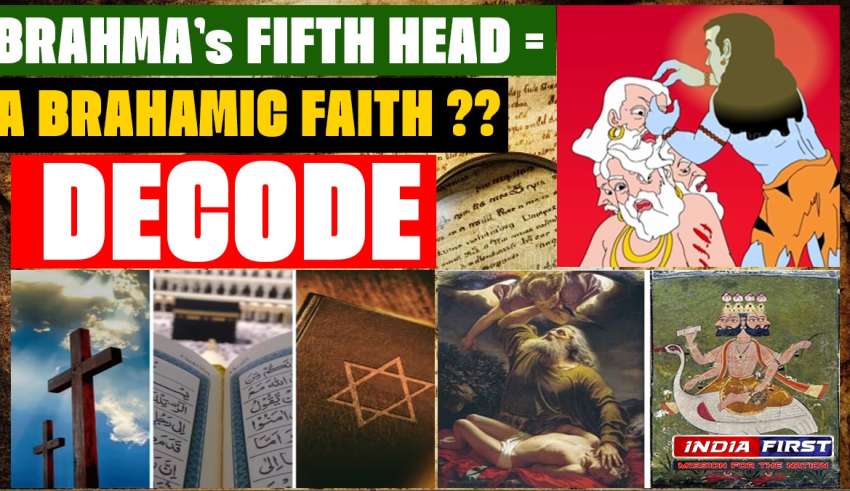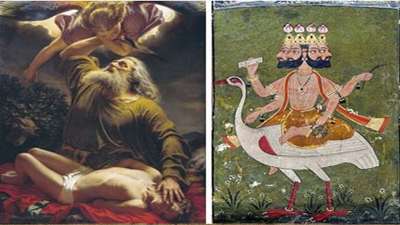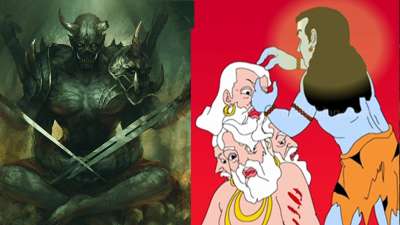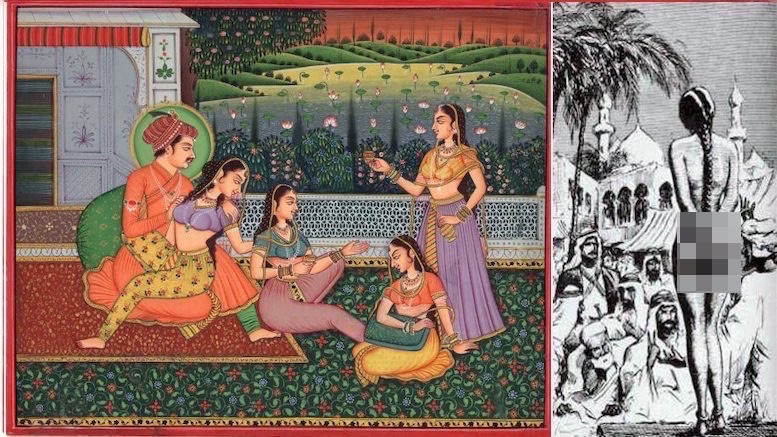
INDIA FIRST | RESEARCH DESK |
The Fifth Head of Brahma, Shiva, and the Demons’ Worship:

The Story of Brahma’s Fifth Head and Its Symbolism
In Hindu scriptures and Puranas, the fact of Brahma’s fifth head stands as a profound symbol.
While Brahma’s four heads represent the knowledge of the Vedas, his fifth head became a symbol of lust, ego, and opposition to the Vedas.
When this head turned into an embodiment of unrighteousness, Lord Shiva himself appeared in the form of Kalabhairava and severed it.

Why Did the Fifth Head Become a Symbol of Destruction?
It is said that Brahma’s fifth head became obsessed with his own mind-born daughter. This lust did not represent divinity, but a fallen tendency. When opposition to the Vedas combines with lust, it becomes fatal for Dharma (righteousness).
By cutting off this head, Shiva issued a warning: straying from Dharma leads to destruction.

Did Demons Worship the Severed Head of Brahma?
• Could the creator of the universe, Brahma, grant boons to demons for the universe’s destruction?
• Could the creator of the universe, Brahma, grant boons to demons for the universe’s destruction?

• Could demons, known for their anger and darkness, perform disciplined penance to Brahma?
• If so, shouldn’t their demonic tendencies end after receiving his blessings? But the opposite happens: demons become more arrogant and destructive after gaining boons.
It means they actually worship ‘ BRAHMA ‘ but that the fifth head which was anti vedas and demonic.
The Greatest Mystery of Universe :
According to some Puranic interpretations, the “Brahma penance” performed by demons was actually the worship of Brahma’s severed fifth head. This skull symbolized opposition to the Vedas, was filled with ego, and blinded by lust.
Demons drew inspiration from this, gaining destructive powers and using Brahma’s boons for the ruin of gods and humanity.
![]()
Is Brahma’s Fifth Head = Abrahamic Traditions?
When Brahma’s fifth head became a symbol of anti-Vedic, lustful, and egotistical tendencies—obsessed with his own daughter Shatarupa—Shiva destroyed it through Kalabhairava.
But just as Rahu and Ketu cannot be killed, the consciousness of Brahma’s head was not destroyed, only transformed.
Some suggest that this perverted consciousness lives on in the “Abrahamic traditions,” with its most extreme form seen in modern Islamic extremism.
Veda Opposition Is the Root Problem:

The core traits of Abrahamic traditions are:
• Rejection of the Vedas
• Rejection of the Vedas
• Condemnation of idol worship
• Denial of religious freedom
• Considering women as property
• Justifying violence in the name of religion
Are these not the same qualities as Brahma’s fifth head, which nourished unrighteousness instead of Dharma?

Parallels Between Islamic Extremism and the Fifth Head
• The fifth head was obsessed with its own blood—his daughter.
• The fifth head was obsessed with its own blood—his daughter.
• In some Islamic communities, marriage within close kin is considered pure.
• Demons received destructive boons by worshipping this head.
• Today, suicide bombers are lured by the promise of heavenly rewards.
• Demons were destroyers of Dharma, and Islamic extremism is seen as an enemy of global culture, freedom, and women’s dignity.Is this mere coincidence?
Abraham = A-Brahma = Anti-Vedic Consciousness
Some Vedic scholars believe “Abraham” derives from “A-Brahma” or “unnatural Brahma”—a creative force acting against the laws of Dharma.
Abrahamic traditions clash with the Vedas and appear to inherit the same deviant consciousness that Shiva rejected.

Conclusion :
The ideological roots of what is called Islamic extremism today seem linked to the consciousness of Brahma’s fifth head—arrogant, anti-Vedic, misogynistic, and violent.
By severing that head, Shiva did not just punish a deity, but rejected a consciousness that spread unrighteousness in the name of religion.
Today, it is time to heed that warning again and recognize which ideologies are worshipping the “severed head” .
indiafirst.online
